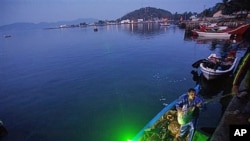Despite strict Sharia laws mandating that Muslim women wear headscarves and banning alcohol consumption, international tourism on the island of Sabang in Indonesia's Aceh province is growing.
The key to success has been that both hotel owners and local officials have agreed to make compromises to accommodate Western visitors and to respect the local culture.
When American tourist Mollie Hightower and her husband Brian Hubler visited Sabang island to go diving and snorkeling, she was a little concerned about wearing a bikini in a region where Muslim women are required to wear headscarves and long clothing at all times.
“Before I went out in a swimsuit, I asked, and I wanted to make sure it was OK on this beach to be traipsing around in a bikini, and they said it was fine in the resort area,” said Hightower.
Hubler said it is a bit strange to see women in headscarves and heavy clothing on the beach in this tropical climate.
“The most obvious part, and this would extend maybe even beyond Sharia law to just Muslim countries in general, is the sort of, the amount of clothing that women have to wear in the extreme heat and humidity is sort of baffling,” said Hubler.
Tourism on Sabang, also known as Pulau Wey, has been growing since the 2005 peace agreement between the Indonesia government and local insurgents, which ended 30 years of conflict in Aceh Province.
It is accessible only by ferry. But neither its remote location, nor the implementation of Sharia law in Aceh has kept visitors from coming.
One of the leaders of Sabang's tourism industry is hotel owner Freddie Rousseau. A former United Nations official, he first came to Aceh as part of the relief efforts following the 2004 tsunami.
In the past year his hotel, the Santai Sumur Tiga, has been operating at 80 percent capacity, and a number of new hotels are under construction.
Rousseau said the hotels have helped the local economy by buying food and materials, and providing jobs. Local officials have voiced strong support for tourism as a vital part of the Island's development. This support includes exempting Western visitors on hotel grounds from Islamic regulations like the ban on alcohol.
“Despite the fact that it is according to the Sharia law illegal, the fact that I only supply alcohol to internationals or non-Muslims makes the people tolerate that aspect as well,” he said.
Although Westerners do not have to abide by the dress code in general in Aceh, wearing skimpy swimming suits and other revealing clothing is frowned on in the province, the only part of Indonesia where Sharia is used.
Rousseau said the exemption for tourism does not apply to some other laws. For example, he reassured authorities he will not permit unmarried couples to sleep together.
Sabang Mayor Munawar Liza Zainal said there is no conflict between tourism and Islam, as long as the visitors respect the local culture. This means dressing appropriately when visiting the villages and not having loud parties.
He said drinking and partying, which would annoy the people, is unnecessary. But if it is just common consumption, he said he thinks a Muslim cannot prohibit others [non Muslims] from doing that.
Zainal also said local Muslims are well educated and morally strong enough to resist Western temptations.
Rousseau said keeping Sabang a quiet, safe and unspoiled alternative to overcrowded Bali, Indonesia's top visitor destination, also is in the interest of the tourist industry.
“We never want to be a second Bali. We want this place to remain unspoiled, where people can come and have privacy, can enjoy themselves without being harassed. Without traffic jams, without pollution,” said Rousseau.
Rousseau said international tourism can continue to grow in Sabang, despite its Sharia law, as long as it remains out of sight and the local culture remains intact.





